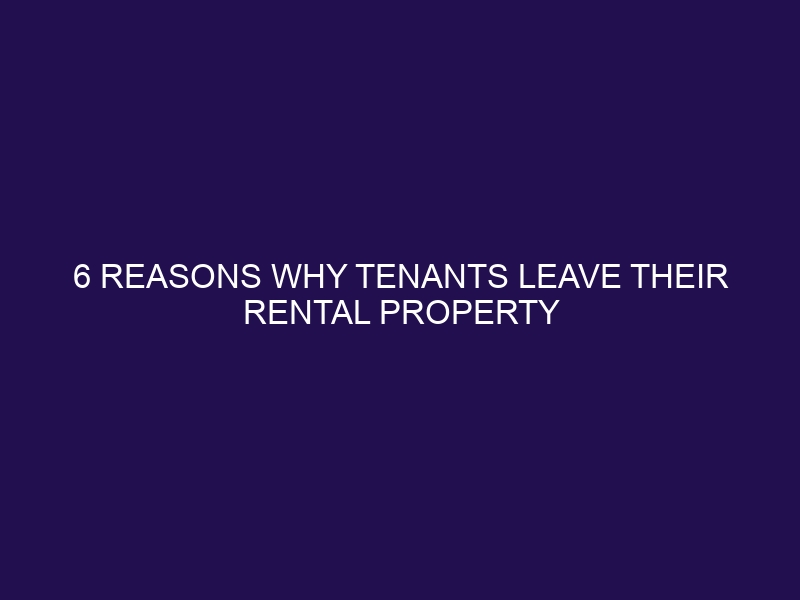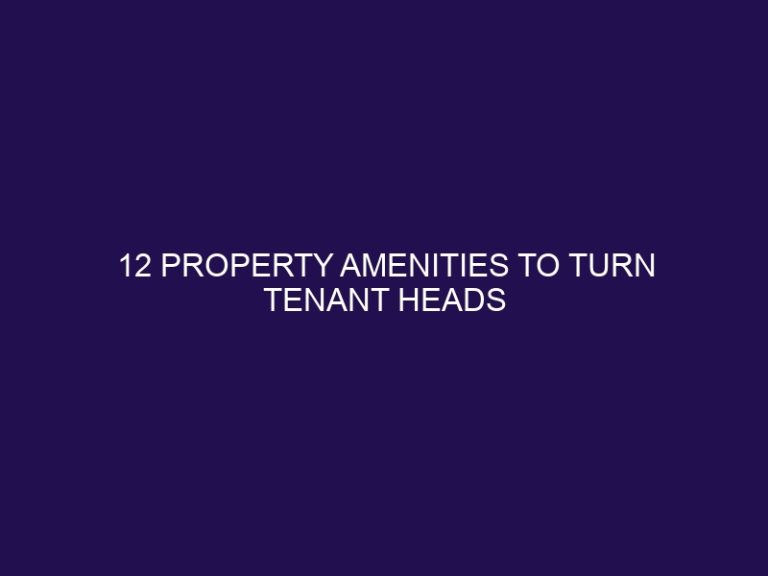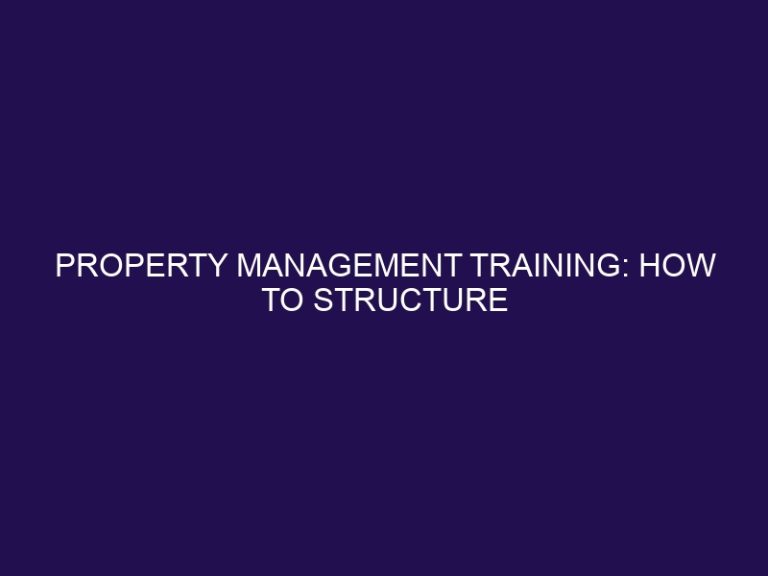6 Reasons Why Tenants Leave Their Rental Property
“
Retaining tenants is crucial for landlords and property managers, as high tenant turnover can lead to increased costs and vacancies. Understanding why tenants choose to leave their rental property is essential to address these issues and create a desirable living environment. Based on industry research and expert insights, here are six common reasons why tenants decide to move out:
- High Rental Costs: One of the primary factors influencing tenant decisions is the cost of rent. If the rent becomes unaffordable or increases significantly, tenants may seek more affordable options elsewhere.
- Poor Maintenance and Repairs: Tenants expect their rental property to be well-maintained and any necessary repairs to be promptly addressed. Neglecting maintenance issues can lead to frustration and dissatisfaction.
- Unresponsive or Ineffective Landlord: A lack of responsiveness from the landlord or property management can lead to tenant frustration. Effective communication and prompt action are crucial for tenant satisfaction.
- Inadequate Security Measures: Tenants prioritize their safety and security. If a rental property lacks proper security measures, such as secure locks or surveillance systems, it can make tenants feel unsafe and prompt them to leave.
- Issues with Neighbors: Noise disturbances, conflicts with neighbors, or an undesirable living environment due to disruptive tenants can significantly impact a tenant’s decision to move out.
- Lack of Amenities or Upgrades: Properties with limited amenities or outdated features may fail to meet tenants’ expectations. Tenants desire modern amenities, such as laundry facilities, parking, gym access, and updated appliances.
By addressing these reasons proactively, landlords can create a more attractive rental property and improve tenant retention. Understanding and addressing tenant concerns can lead to longer lease terms and a higher level of tenant satisfaction.
“
Reason 1: High Rental Costs
Reason 1: High Rental Costs
High rental costs are a significant reason why tenants decide to leave their rental properties. Here are some factors to consider when it comes to high rental costs:
Financial strain: High rental costs can cause a considerable strain on tenants’ finances, making it challenging for them to afford other necessities or save money.
Limited affordability: Tenants may feel that the rental costs do not align with the value they receive from the property, leading them to search for more affordable options.
Escalating expenses: If rental costs continue to increase over time, tenants may find it unsustainable and choose to relocate to a more affordable property.
Competitive market: In rental markets with high demand, landlords may raise rental costs due to increased competition, prompting tenants to look for more affordable alternatives.
Lack of rental assistance: Tenants facing financial difficulties may not receive enough rental assistance or support, making it more difficult for them to afford high rental costs.
Unmet expectations: Tenants may discover that the rental property does not meet their expectations or justify the high rental costs, motivating them to search for better options.
Reason 2: Poor Maintenance and Repairs
Poor maintenance and repairs are one of the primary reasons why tenants choose to leave their rental properties. When landlords neglect necessary upkeep, tenants feel frustrated and unsupported. To avoid this issue, landlords should prioritize maintenance and promptly address repairs. Here are some specific concerns tenants have when it comes to poor maintenance and repairs:
| Concern | Description |
|---|---|
| 1. Delayed response to repair requests | Tenants get dissatisfied when landlords take too long to respond to their repair requests, leading to frustration and inconvenience. |
| 2. Inadequate repairs that result in recurring issues | When landlords fail to fix problems properly, tenants experience recurring issues that disrupt their daily lives and make them feel unheard. |
| 3. Unsafe living conditions due to negligence in maintaining essential systems | Landlords have a responsibility to ensure the safety of their tenants by maintaining essential systems like electrical and plumbing. Negligence in this regard creates hazardous living conditions. |
| 4. Lack of regular maintenance leads to deterioration of the property | When landlords neglect regular maintenance tasks like painting, cleaning, and landscaping, the property starts to deteriorate and loses its appeal, making it undesirable for tenants. |
| 5. Unresolved safety concerns, such as faulty electrical or plumbing systems | If landlords do not address safety concerns promptly, tenants may face the risk of accidents or property damage. Faulty electrical or plumbing systems pose a significant threat if left unresolved. |
| 6. Lack of general upkeep, resulting in an unattractive living environment | When landlords do not maintain the overall appearance and cleanliness of the property, it becomes unattractive and unwelcoming for tenants, impacting their satisfaction and desire to stay. |
Tenants deserve to live in a well-maintained and safe rental property, and it is the responsibility of landlords to fulfill this expectation. By ensuring proper maintenance and timely repairs, landlords can cultivate long-term tenant satisfaction and reduce turnover.
Reason 3: Unresponsive or Ineffective Landlord
Reason 3: Unresponsive or Ineffective Landlord
- Delayed Response: When tenants have maintenance issues or concerns, a lack of communication from the landlord can be frustrating and create a sense of neglect.
- Slow Problem Resolution: A landlord who fails to address or resolve issues in a timely manner can create a negative living experience for tenants.
- Lack of Support: Tenants expect their landlord to provide necessary support and guidance throughout their tenancy, such as ensuring repairs are promptly made and addressing any issues that arise.
- Inflexibility: An unresponsive or ineffective landlord may be unwilling to accommodate reasonable requests or negotiate lease terms, leading to tenant dissatisfaction.
To avoid being an unresponsive or ineffective landlord, it is important to prioritize communication, address tenant concerns promptly, and be open to reasonable requests. Regularly checking in with tenants and actively addressing their needs can help foster positive relationships and encourage them to stay long-term.
Reason 4: Inadequate Security Measures
Having inadequate security measures is Reason 4 why tenants may choose to leave a rental property. Tenants prioritize their safety and seek a secure living environment. Insufficient security measures such as broken locks, lack of proper lighting, or malfunctioning alarm systems can make tenants feel vulnerable and unprotected. Landlords should invest in robust security systems, regular maintenance, and prompt repairs to address these concerns.
True story:
A friend of mine once rented an apartment that had a faulty lock on the front door. Despite repeated complaints to the landlord, the issue was not resolved promptly. This lack of adequate security measures made my friend feel unsafe and compelled them to find a new, more secure place to live.
Reason 5: Issues with Neighbors
Reason 5: Issues with Neighbors can be a significant reason why tenants decide to leave their rental property. Noisy neighbors, frequent disputes, and lack of privacy can create an uncomfortable living environment. Living in close proximity can make it difficult to escape these problems, leading to frustration and dissatisfaction. It is important for landlords to address these issues promptly to ensure tenant satisfaction. Encouraging open communication, setting clear guidelines, and addressing complaints promptly can help cultivate a peaceful and harmonious living environment. Ultimately, a positive and respectful relationship between neighbors can enhance the overall rental experience for tenants.
Reason 6: Lack of Amenities or Upgrades
When tenants are looking for a rental property, amenities and upgrades are crucial factors that significantly influence their decision-making process. The absence of these amenities or upgrades can lead to dissatisfaction and, ultimately, tenants leaving the property.
- Amenities: It is expected that tenants would have certain expectations such as access to a well-equipped gym, a refreshing swimming pool, or convenient laundry facilities. If a rental property fails to offer these amenities, it can make the property significantly less attractive in comparison.
- Upgrades: If a rental property has outdated appliances, worn-out carpets, or old fixtures, it gives the property an unkempt and unappealing appearance. Consequently, tenants may be prompted to explore better options elsewhere.
- Competitive market: In a fiercely competitive rental market, tenants are presented with numerous choices. Rental properties that lack amenities or upgrades often struggle to attract and retain tenants amidst the abundance of available options.
- Desire for comfort: Tenants naturally seek to live in a comfortable and modern space that fulfills their needs. Inadequate amenities and upgrades can make tenants feel that their needs and preferences are not being adequately addressed.
To illustrate, consider a tenant who made the decision to leave their rental property due to the absence of amenities and upgrades. They discovered another property within the same neighborhood that offered a well-equipped gym, updated appliances, and a contemporary interior. The tenant believed that this new property better catered to their lifestyle and needs, ultimately motivating their choice to relocate.
Frequently Asked Questions
Why do tenants leave their rental property?
There are several reasons why tenants leave their rental property:
- 1. Affordability: Many tenants move out due to financial struggles or seeking better value.
- 2. Job relocation: Job changes often require tenants to change locations, leading them to move out of their current rental.
- 3. Family responsibilities: Changes in family responsibilities, such as needing more space or a better school district, can prompt tenants to look for a different rental property.
- 4. Better opportunities: Some tenants decide to move out in order to purchase a home and invest in real estate, especially young and middle-aged couples and families.
- 5. Negative experiences: A negative experience with their current landlord, such as breach of contract or ongoing neighbor issues, may lead tenants to seek a new rental property.
- 6. Unexpected life events: Unexpected life events, like the COVID-19 pandemic or medical bills, can put tenants in a financial bind and necessitate a move.
How can landlords improve tenant retention?
Landlords can improve tenant retention by:
- 1. Offering desirable amenities: It is important for landlords to provide amenities that tenants value, such as modern appliances or communal spaces.
- 2. Maintaining positive relationships: Building and maintaining positive relationships with tenants can enhance their overall rental experience and encourage them to stay longer.
- 3. Investing in properties of various sizes: Offering properties with a range of sizes and floor plans can cater to different tenant needs and reduce the likelihood of them moving out due to lack of space.
- 4. Honoring promises made in the lease: Landlords should fulfill their obligations, such as fixing maintenance issues promptly or reducing rent as agreed upon in the lease.
- 5. Showing compassion during difficult times: When tenants face unexpected life events, landlords can demonstrate understanding, flexibility, and support to help them through tough situations.
- 6. Remaining professional and respectful: Landlords should maintain professionalism and respect towards tenants, even if they choose to leave for personal or professional reasons. This can foster a positive reputation and encourage future tenants to stay longer.
Why is ROI important for real estate investors?
ROI (Return on Investment) is crucial for real estate investors because it measures the profitability of an investment property. Higher ROI suggests a more lucrative investment, while lower ROI indicates lower returns. It helps investors evaluate the potential financial gains from a property and make informed decisions about their investment portfolio.
How does understanding foreclosures benefit real estate investors?
Understanding foreclosures is important for real estate investors because it can provide investment opportunities. Investors who are knowledgeable about the foreclosure process can identify undervalued or distressed properties and potentially acquire them at a lower price. Additionally, understanding the foreclosure process is helpful in case investors themselves face foreclosure, allowing them to navigate the situation and minimize potential losses.
What are common reasons for tenants to move out of an apartment?
Common reasons tenants move out of an apartment include:
- 1. Affordability: Many tenants often move due to financial struggles, such as job loss or medical bills, that make it difficult to afford the rent.
- 2. Lack of space: Tenants may choose to move out if they feel the apartment does not provide enough space for their needs, whether it’s due to a growing family or personal preferences.
- 3. Job relocation: Job changes or transfers might require tenants to move to a different city or area, making it necessary for them to leave their current apartment.
- 4. Neighbor issues: Ongoing conflicts with neighbors can make living in the apartment complex unpleasant, leading tenants to search for a more harmonious environment.
- 5. Breach of contract: If landlords fail to meet obligations outlined in the lease agreement, such as failing to address maintenance issues or disregarding tenant rights, tenants may choose to move out.
- 6. Unexpected life events: Events like the COVID-19 pandemic or other unforeseen circumstances can create the need for tenants to move out due to financial, health, or personal reasons.
How can landlords address affordability concerns to prevent tenants from moving out?
Landlords can try to find a middle ground to keep tenants by:
- 1. Offering a less expensive unit: If tenants express affordability concerns, landlords can provide options for moving to a smaller square footage or less expensive apartment within the rental property.
- 2. Temporarily reducing rent: Landlords may consider reducing the rent temporarily to help tenants who are struggling financially, allowing them to stay in the same unit.







